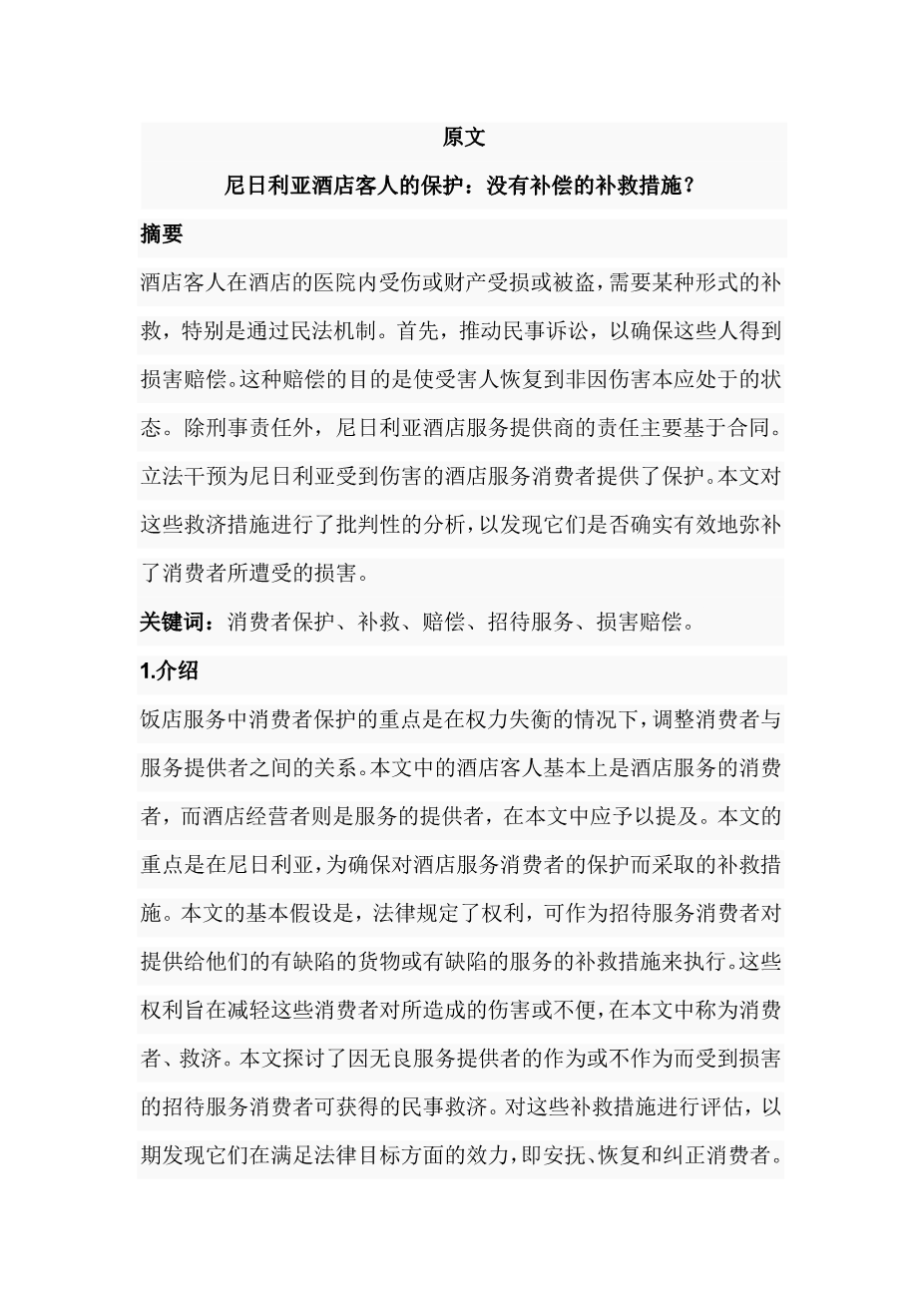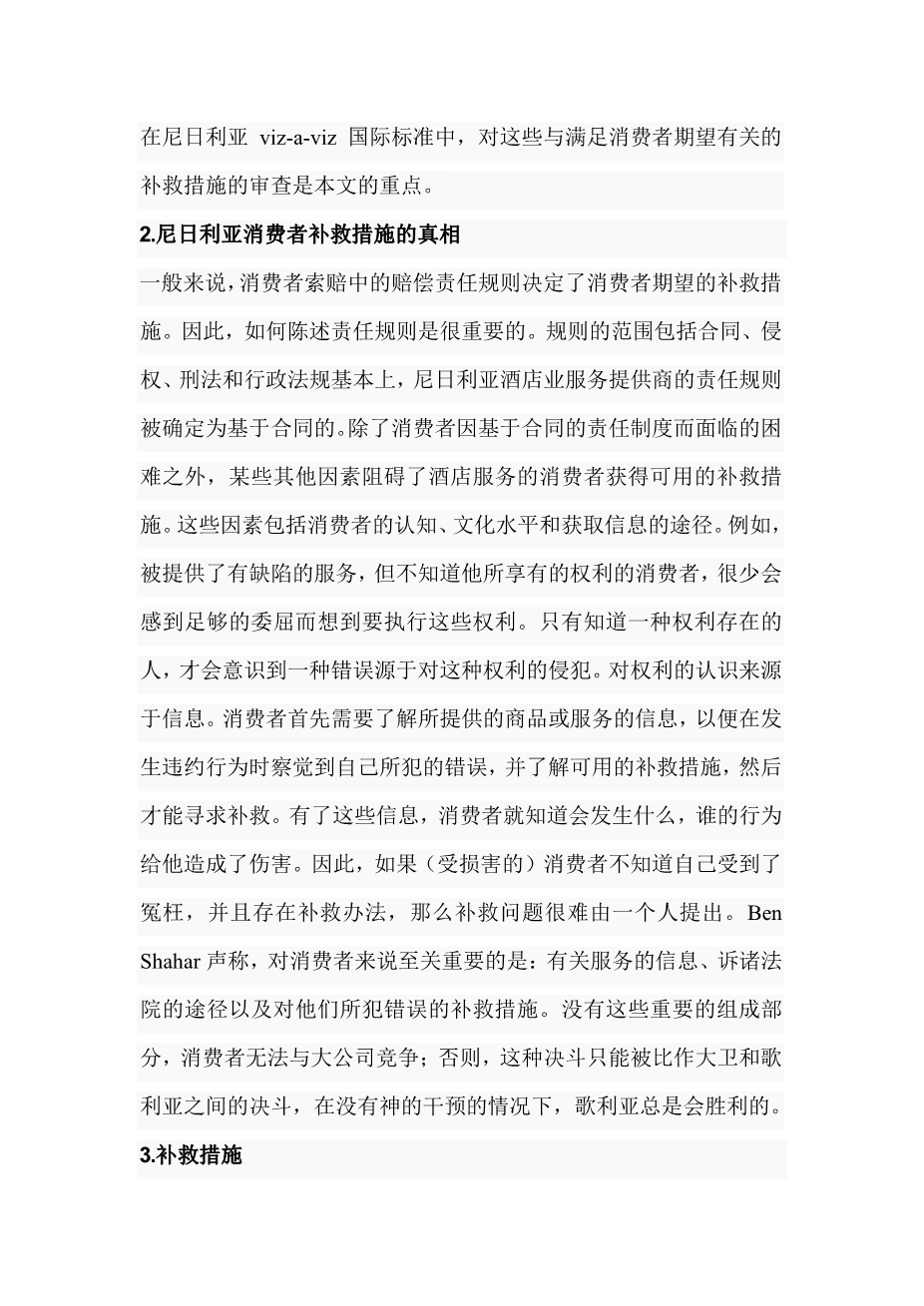Protection of Hotel Guests in Nigeria: Remedies without Redress?
Dr. Etefia Ekwere Ekanem LL.B, LL.M, PhD in Commercial and Property Law (Consumers Protection Law) (Nig.), B.L., ChMC; Senior Lecturer, Department of Public Law, Faculty of Law, University of Uyo, Uyo, Nigeria
Abstract
A hotel guest injured or who has his property damaged or stolen within the hospitium of the hotel expects some form of redress, particularly, through the civil law mechanism. Primarily, civil proceedings is driven to ensure that such persons are compensated for the damaged suferred. Such compensation is directed at restoring the victim to the position he would have been but for the injury. This is captured in the maxim, ubi jus ibi remedium.[1] Besides criminal liability, the liability of service providers in the hospitality services in Nigeria is largely contract-based. Legislative intervention provides protection for injured consumers of hospitality services in Nigeria. This paper critically analyses these remedies to discover whether indeed they effectively redress the injury suffered by consumers.
Keywords:Consumer protection, remedies, compensation, hospitality services, damages.
1. Introduction
The focus of consumer protection in the hospitality services is the adjustment in the relationship between the consumer and the service provider, in the face of the power imbalance in favour of the latter. The hotel guest in this paper is basically the consumer of hospitality services, while the hoteliers are the service providers, and they shall be so referred herein. This paper focuses on the remedies for ensuring the protection of consumers of hospitality services in Nigeria. The assumption underlying this paper is that the law provides rights, enforceable as remedies by consumers of hospitality services for defective goods or deficient services supplied to them. These rights, which are intended to assuage such consumers for injuries or inconveniences caused, are referred to herein as consumers, remedies. This paper examines the civil remedies available to a consumer of hospitality services who has been injured by the act or omission of unscrupulous service provider. These remedies are appraised with a view to discovering their potency in meeting the aims of the law, which is, assuaging, restoring and redressing the consumer. The examination of these remedies in relation to meeting the consumers expectation in Nigeria viz-a-viz international standard is the focal point of this paper.
2. Truth about Consumer Remedies in Nigeria
Generally, the liability rule in a consumer claim determines the remedy the consumer expects. Thus, it is important how the liability rule is stated. The range of rules covers contract, torts, criminal law [2] and administrative regulation.[3] Basically, the rules governing liability of service providers in the hospitality industry in Nigeria has been identified to be contract based.[4] Aside from the difficulties faced by consumers as a result of the contract-based liability regime,[5] certain other factors inhibit the consumer of hospitality services from accessing the remedies available to him. These factors include the consumers otiose perception, level of literacy and access to information. For instance, the consumer who has been supplied deficient service, but is not aware of the rights available to him, will seldom feel aggrieved enough to think of enforcing such rights. It is only a man that knows about the existence of a right that perceives a wrong flowing from the infraction of that right. Knowledge of right comes from information. The consumer needs to first have information about the goods or services supplied, to perceive a wrong done to him when there is a breach, be aware of available remedies, before redress can be sought. With information the consumer knows what to expect and whose conduct has caused him injury. Therefore, the issue of redress can hardly be raised by one, where the (aggrieved) consumer is unaware that he has been wronged, and that there exists a remedy.
Ben-Shahar asserts that vital to the consumers are; information about the service,access to courts, and remedies for wrongs done to them.[6][7] A consumer cannot compete with large corporations without these vital components; otherwise such a duel can only be likened to one between a David and a Goliath, where in the absence of divine intervention, Goliath would always triumph.[8]
3. Remedies
3.1 Civil Remedies
Civil remedies symbolise the substantive remedies that an aggrieved consumer of hospitality services can personally pursue.[9] The commonest of civil remedies for consumers of hospitality services seems to be claim for damages.[10] Apart from damages, there are other types of civil remedies that may avail a hotel guest who has been adversely affected by defective goods or deficient services rendered by a hotelier or other service providers.
These include specific performance, refund, replacement and repair.
a. Damages:
At common law, damages are the common remedy available to an aggrieved consumer who has been a victim of the provision of poor hospitality service. Damages are paid to compensate an aggrieved consumer for loss, injury, or harm suffered as a result of anothers breach of duty. Generally, the guiding principle in the award of damages is restitutio in integram, that is, to restore the injured person to his original position. The aim of damages in contract is to restore the plaintiff in as good a position as he would have been if the contract had been performed,5 while in tort, it is designed to put the plaintiff in as good a position as he would have been if the tort had not been committed against him.[11][12][13] Damages offer an aggrieved consumer of deficient hospitality service, or one who has suffered
剩余内容已隐藏,支付完成后下载完整资料


英语译文共 20 页,剩余内容已隐藏,支付完成后下载完整资料
资料编号:[605512],资料为PDF文档或Word文档,PDF文档可免费转换为Word
您可能感兴趣的文章
- 饮用水微生物群:一个全面的时空研究,以监测巴黎供水系统的水质外文翻译资料
- 步进电机控制和摩擦模型对复杂机械系统精确定位的影响外文翻译资料
- 具有温湿度控制的开式阴极PEM燃料电池性能的提升外文翻译资料
- 警报定时系统对驾驶员行为的影响:调查驾驶员信任的差异以及根据警报定时对警报的响应外文翻译资料
- 门禁系统的零知识认证解决方案外文翻译资料
- 车辆废气及室外环境中悬浮微粒中有机磷的含量—-个案研究外文翻译资料
- ZigBee协议对城市风力涡轮机的无线监控: 支持应用软件和传感器模块外文翻译资料
- ZigBee系统在医疗保健中提供位置信息和传感器数据传输的方案外文翻译资料
- 基于PLC的模糊控制器在污水处理系统中的应用外文翻译资料
- 光伏并联最大功率点跟踪系统独立应用程序外文翻译资料



